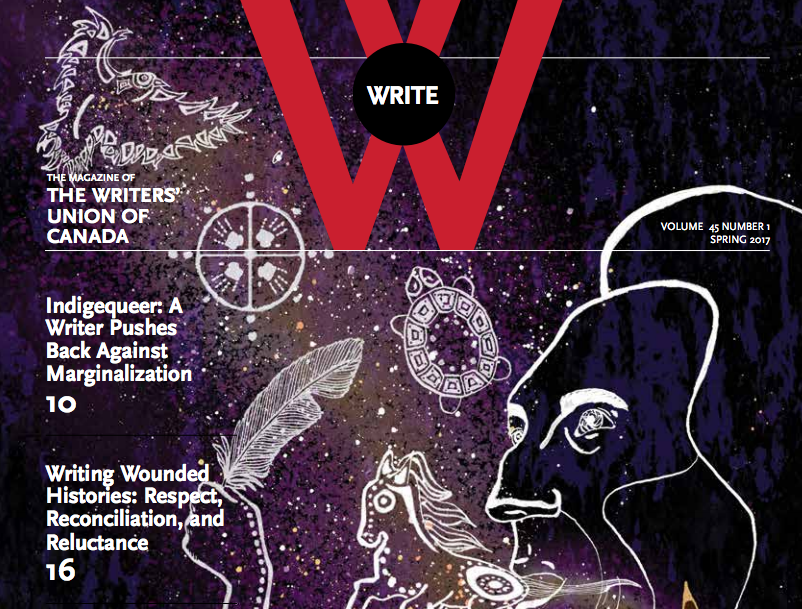The writers featured in the latest issue of Write Magazine deserve notice for their excellent work.
By Richard Jensen
The single best word to summarize the spring issue of Write focused on Indigenous authors is this: Pain.
Every single piece in the magazine is about the suffering that is a daily part of Indigenous lives, whether that pain be openly expressed; challenged such as in Joshua Whitehead’s piece “On Indigenegativity”; or the micro aggressions that seep into the language of Jesse, Helen Knott’s character in the short story “Fat Rabbits & Wry Smiles.”
Yet that single word can never paint the whole picture, because it is not the pain that is the focus. There are no claims of being victims. Instead, myriad voices powerfully sing out in as many different ways that are possible within such a small confine. These varied voices show different ways how the pain is addressed, managed, and how the path to healing can be achieved.
Despite these various forms the issue can be read as a continuous story, one held by many different speakers, singers, and poets. A word of caution, though, must be given: because there are no soft introductions, the space created in Write is powerfully raw in its depiction of the ways Indigenous people still suffer from the effects of centuries-long genocidal actions.
In each piece you can pick out the traumas that litter the Indigenous psyche. Whitehead proclaims: “If you put a microphone in front of me I will call out settler colonialism, ravage its thin façade like a sheet in the wind — and then cut myself on shattered bits of whiteness while I drown in a pool of liberal tears.”
This statement can be felt throughout all the pieces that follow it. Even in Shannon Webb-Campbell’s piece on the “Golden Age of Indigenous Publishing” that we are in the midst of, the issues being brought forward are defined by their trauma, as the issues of reconciliation and the struggle to deal with and make right what was wronged are hammered out in literary ways.
While Webb-Campbell is not purposefully putting forward the narrative of colonialism, it is still the actions of the genocide within Canadian history that are defining this new age of publishing. Even while the authors and publishers are establishing their own paths, own ways and own means to get their stories written, published, and understood, it is still within a context that is categorically controlled by the colonial powers-that-be. The language is steeped in the past traumas and it is impossible to leave them behind.
Yet it would be unfair, unkind, and downright unintelligent to not be able to see beyond these traumas, and see the ways that they are being addressed. The pain that each of these authors feels cannot be avoided, and unfortunately that’s usually where the thinking stops, bogged down in a sense of guilt or misplaced sympathy for the plight of the “red man.” But you see in the language repeatedly words like empathy, humour, love, land, medicine — and the power that these words hold.
Tanya Roach, Louise Bernice Halfe, and Alicia Elliott all very rightly point out the importance of words within Indigenous communities, and the value that is put on being able to put the right words in the right place to bring forth truth and healing.
These women very powerfully show in different ways how they address the lateral violence of colonial thought, the poisonous self-degradation within the embodying stereotypes like self-fulfilling prophecies, and the damage done by appropriation of the Indigenous voice. In their individual ways, they create a chorus of words woven together to navigate the good path. Theirs is a philosophy based on the land, on the stories, and on the people who benefit from these things and who can benefit one another within those same spaces. It is affirming to see so many female authors, female voices, carrying forward the words and medicine that is needed to address the pain that they share.
I would be remiss if I did not at least touch on Mr. Hal Niedzviecki’s editorial on appropriation. While the former editor of Write states he does not believe in cultural appropriation, I, in turn, do not believe in tolerating genocidal language. There is no need to debate what he said and if it is worth debate or discussion, because, simply put, it is the new language of the colonizer to continue genocidal acts by denying Indigenous voices and culture. Did Mr. Niedzviecki read the articles he was editing? Every single piece in this edition touches on cultural appropriation in some way, most notably Elliott’s. “On Seeing and Being Seen: Writing with Empathy” points out that diversity is always in relation to what is defined as white, directly citing a potlatch story that incorrectly described the actual ceremony.
But in truth I would thank Mr. Niedzviecki for his awful editorial because it was the perfect introduction to what all of the Indigenous authors he tries to silence are fighting against. It also very neatly demonstrates that even when space is made for the Indigenous voice, it frequently comes with the caveat that it is only by the munificence of the colonizer that we are allowed to speak.
Issues of Write magazine can be accessed here.

